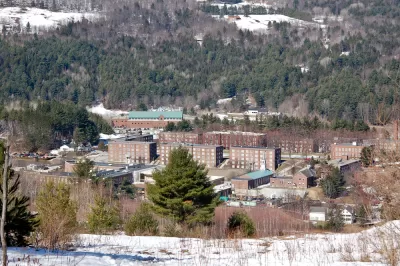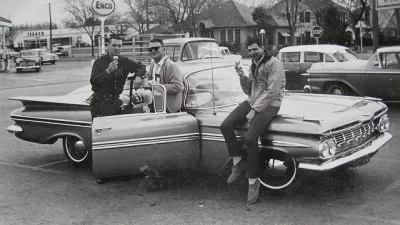Academia's "two-body problem" may be affecting other industries as women pursue more specialized careers and marry similarly educated men. Two-career couples are likely to gravitate toward larger metro areas with job opportunities for both partners.

Women are increasingly earning advanced degrees in specialized fields. Combine this with the fact that people of similar education levels tend to marry one another and highly skilled laborers often have to move for better job opportunities and you have the "two-body problem." The term is commonly used by academics to describe the conflicts that occur when PhD's marry one another. Tenure-track jobs are scarce, highly specialized, and often located in remote college towns, making it difficult for both partners to find a job in the same location.
As the number of women lawyers, doctors, scientists, business executives, and engineers increases, more highly-educated couples outside academia are facing the two-body problem.
The natural solution for many couples is a move to a larger metropolitan area that can provide more career options in a variety of fields. In the nation's largest metro areas, a higher share of couples have two college degree holders, while couples with one college graduate are more evenly distributed.
The two-body problem could mean trouble for smaller towns and cities trying to attract highly-skilled jobs and workers. Local economic developers need to think regionally to cobble together opportunities for skilled workers' romantic partners. More creative working options may also become more common. Many of the top metro areas for telecommuting are small cities with major universities - ground zero for the two-body problem.
FULL STORY: Could the “two-body problem” be contributing to rural brain drain?

Alabama: Trump Terminates Settlements for Black Communities Harmed By Raw Sewage
Trump deemed the landmark civil rights agreement “illegal DEI and environmental justice policy.”

Study: Maui’s Plan to Convert Vacation Rentals to Long-Term Housing Could Cause Nearly $1 Billion Economic Loss
The plan would reduce visitor accommodation by 25% resulting in 1,900 jobs lost.

Planetizen Federal Action Tracker
A weekly monitor of how Trump’s orders and actions are impacting planners and planning in America.

Waymo Gets Permission to Map SF’s Market Street
If allowed to operate on the traffic-restricted street, Waymo’s autonomous taxis would have a leg up over ride-hailing competitors — and counter the city’s efforts to grow bike and pedestrian on the thoroughfare.

Parklet Symposium Highlights the Success of Shared Spaces
Parklets got a boost during the Covid-19 pandemic, when the concept was translated to outdoor dining programs that offered restaurants a lifeline during the shutdown.

Federal Homelessness Agency Places Entire Staff on Leave
The U.S. Interagency Council on Homelessness is the only federal agency dedicated to preventing and ending homelessness.
Urban Design for Planners 1: Software Tools
This six-course series explores essential urban design concepts using open source software and equips planners with the tools they need to participate fully in the urban design process.
Planning for Universal Design
Learn the tools for implementing Universal Design in planning regulations.
Caltrans
Smith Gee Studio
Institute for Housing and Urban Development Studies (IHS)
City of Grandview
Harvard GSD Executive Education
Toledo-Lucas County Plan Commissions
Salt Lake City
NYU Wagner Graduate School of Public Service





























